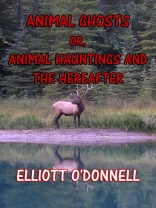In opening this volume on Animals and their associations with the unknown, I will commence with a case of hauntings in the Old Manor House, at Oxenby.
My informant was a Mrs. Hartnoll, whom I can see in my mind’s eye, as distinctly as if I were looking at her now. Hers was a personality that no lapse of time, nothing could efface; a personality that made itself felt on boys of all temperaments, most of all, of course, on those who—like myself—were highly strung and sensitive.
She was classical mistress at L.’s, the then well-known dame school in Clifton, where for three years—prior to migrating to a Public School—I was well grounded in all the mysticisms of Kennedy’s Latin Primer and Smith’s First Greek Principia.
I doubt if she got anything more than a very small salary—governesses in those days were shockingly remunerated—and I know, —poor soul, she had to work monstrously hard. Drumming Latin and Greek into heads as thick as ours was no easy task.
But there were times, when the excessive tension on the nerves proving too much, Mrs. Hartnoll stole a little relaxation; when she allowed herself to chat with us, and even to smile—Heavens! those smiles! And when—I can feel the tingling of my pulses at the bare mention of it—she spoke about herself, stated she had once been young—a declaration so astounding, so utterly beyond our comprehension, that we were rendered quite speechless—and told us anecdotes.
Of many of her narratives I have no recollection, but one or two, which interested me more than the rest, are almost as fresh in my mind as when recounted. The one that appealed to me most, and which I have every reason to believe is absolutely true, [1] is as follows:—I give it as nearly as I can in her own somewhat stilted style:—
‚Up to the age of nineteen, I resided with my parents in the Manor House, Oxenby. It was an old building, dating back, I believe, to the reign of Edward VI, and had originally served as the residence of noble families. Built, or, rather, faced with split flints, and edged and buttressed with cut grey stone, it had a majestic though very gloomy appearance, and seen from afar resembled nothing so much as a huge and grotesquely decorated sarcophagus. In the centre of its frowning and menacing front was the device of a cat, constructed out of black shingles, and having white shingles for the eyes; the effect being curiously realistic, especially on moonlight nights, when anything more lifelike and sinister could scarcely have been conceived. The artist, whoever he was, had a more than human knowledge of cats—he portrayed not merely their bodies but their souls.












